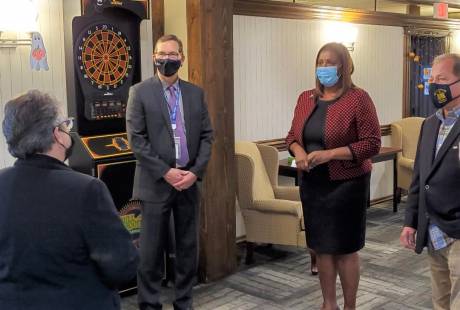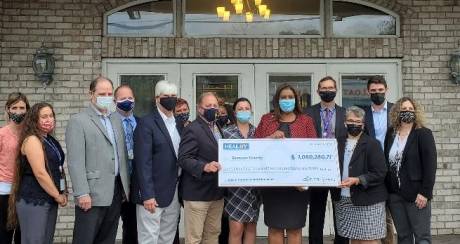
Genesee County legislators, substance use disorder and mental health professionals have a million reasons to celebrate today after meeting New York State Attorney General Letitia James at The Recovery Station on Clinton Street Road.
James is conducting a statewide tour to recognize communities for their efforts in fighting the opioid epidemic and to distribute funds awarded to New York through a settlement with opioid manufacturers and distributors. This afternoon, she presented oversized ceremonial checks in Waterloo, Rochester and Batavia.
For Genesee County, that amount is $1,060,280.71.
“Addiction doesn’t discriminate and transcends all political boundaries and affiliations and artificial constructs,” James said. “This really is a demonstration of what government should do, and that is provide for the needs of New Yorkers and the constituents that we all serve. And to hold those individuals responsible for what they did; we hit them in the pocketbook.”
James said her office “closed down pharma … and five manufacturers and three distributors of this poison.”
Unfortunately, she said, overdosing continues to be a huge problem.
“We’re seeing more overdoses because we know that individuals who use opioids sort of walked into the use of heroin, which is now laced with poisonous fentanyl,” she advised. “So, whatever we can do in our capacity to provide you with additional services, with some medically assistance treatment to assist those who are dealing with not only with opioid use disorder but mental illness.”
Assemblyman Steven Hawley thanked James for her role in the settlement and her “attention to all folks who are having problems with addiction.”
“It doesn’t really identify geographic areas for folks who are having trouble with addiction – whether we live in an urban area or a rural area or a suburban area. It doesn’t matter what you’ve done for a living. It can get everybody …” he added.
Legislature Chair Rochelle Stein, speaking for families “that have been torn apart,” touched upon the significance of James’ tour.
Stein pointed out that Genesee is one of the few counties that operates a mental health department with its own clinics.
“We are struggling, quite frankly, in getting the clinicians. That is a real need,” she said. “If we could get some help there in getting folks into our state or even support for those positions, so that we could have more people available to us to help provide those services.”
James brought up that she has been hearing that the state agencies of the Office of Addiction Services and Supports and the Office of Mental Health do not work together and operate under regulations that often conflict with one another.
Lynda Battaglia, the county’s director of Mental Health & Community Services, said the agencies on a local level have excellent working relationships.
“We collaborate … for the greater good. As we move forward, everybody has the same mission,” she said, later adding that the COVID-19 pandemic has rippled through the industry, causing waiting lists into the hundreds for services due to the adverse effects on delivery and the strain on mental health and substance use counselors.
John Bennett, executive director of Genesee/Orleans Council on Alcoholism and Substance Abuse (which operates The Recovery Station), explained that in Genesee County, several agencies meet on a regular basis, sharing information to increase efficiency across the various sectors.
“Criminal justice, judges, services, community-based organizations, medical care workers – we’re at the table and we talk to each other,” he said. “We try not to let anybody drop through the cracks. We don’t have a ton of services but what we have, they get utilized.”
James said it’s important to not engage in “victim blaming and to be compassionate.”
She said her office is looking at this as a health crisis, reiterating Genesee County’s belief that the funds can be used only for treatment, prevention, education, outreach, etc.
“Unlike the tobacco settlement of old (where) the funds were used for roads and bridges and lights,” she said. “I don’t have anything wrong with roads and bridges and lights – they serve their purpose and hopefully that infrastructure money (federal bill) will build more of them. But these funds have to be related to the litigation and also to assist you in expanding services, and maybe, giving people some raises because they do the work of the angels.”
Bennett mentioned that GCASA is hoping to open its new detoxification center by the first of the year and is advertising for 25 positions, mostly nurses.
“It’s challenging. Right now, we’re biting our nails, going through resumes,” he said.
In closing, James said her goal was to “shine a light on what all of you do here.”
“I come from New York City and half the time the attention is on the city, but we need to focus on rural communities, rural counties because there’s a demand here -- and they cannot be ignored; they cannot be invisible.”
County Manager Matt Landers said the county’s intent is to use the money as directed by the settlement.
“We’ll have interested stakeholders come together to build a consensus on how best to tackle this problem,” he advised.
James said the Finger Lakes Region (Monroe and surrounding counties) will be receiving $53,124,938 from the settlement.
Her plan is to travel to Buffalo, part of the Western New York Region, on Friday.

Photo at top: State Attorney General Letitia James speaks with County Legislature Chair Rochelle Stein, left; GCASA Executive Director John Bennett, and Assemblyman Steven Hawley. Photo at bottom: Presentation of a check to the county to combat the opioid epidemic.
